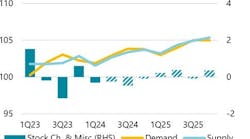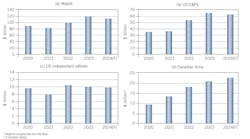Sam Fletcher
Senior Writer
Unless demand for oil collapses within 5-10 years, the world will experience a serious "supply crunch" with prices shooting above $200/bbl for crude, according to an Aug. 8 report by Chatham House, home of the Royal Institute of International Affairs, a leading institute for debate and analysis of international issues.
That's because investment in exploration and development of new crude supplies "has been and will be inadequate," said the report, The Coming Oil Supply Crunch, authored by Paul Stevens, senior research fellow for energy at Chatham House in London and emeritus professor at Dundee University. "Even allowing for some increase in capacity over the next few years, a supply crunch appears likely around 2013," he said.
To ward off a potential crisis, the report recommends helping producers manage the "resource curse" of slower economic growth despite ample natural resources; welcoming investments from sovereign wealth funds; and bringing the Organization of Petroleum Exporting Countries into the International Energy Agency's emergency sharing mechanism.
The pending crunch "is partly due to incentives for international oil companies to return dividends to shareholders rather than reinvest them. It is also a result of a resurgence in 'resource nationalism' and some governments starving their national oil companies of investment funds," the report said. It has "nothing to do with below ground resource constraints or arguments to do with 'peak oil,'" it said.
Rising domestic consumption is eating into the exports of many producer countries while resource nationalism excludes international oil companies (IOC) from helping develop more capacity, Stevens said. Meanwhile, IOC investments are constrained by lack of access to low-cost reserves, manpower shortages, and shortages in the service industries.
A crunch could result from excess crude production capacity falling to low levels followed by a supply disruption, leading to a price spike with "long-lasting effects on the global energy picture," Stevens said.
To avoid a crunch, government energy policies need to reduce the growing demand for liquid fuels, increase the supply of conventional liquid fuels, or increase the supply of unconventional liquid fuels, said Stevens. However, the report concludes: "Only extreme policy measures could achieve a speedy response—and these are usually politically unpopular." It argues that an oil price spike "might break down opposition to a much greater interventionist approach by governments in their energy sectors."
Stevens said, "An intelligent and informed debate is needed about which energy policy interventions are desirable and which are not, and on what basis such judgments should be made." Price escalations have continued "partly because the Organization for Economic Cooperation and Development governments are reluctant to intervene in energy markets. The market alone cannot necessarily provide sufficient incentives for conservation, fuel-switching, or bringing more energy on stream, so this laissez-faire attitude has failed to either constrain demand or increase supply," he said.
Similarities and differences
Escalation of oil prices to record highs in July resembles in some ways the 1970s oil boom. Both periods were characterized by high crude oil prices and a widespread view that the prices would go ever higher, said Stevens. Each time, price increases were triggered "by similar causes, with supply and demand playing a role," he said. "Following the oil shocks of the 1970s, the vast majority of what were then classed as developing countries did not pass on the higher international price of crude to their consumers, preferring instead to subsidize product prices." Today several countries, including the major oil exporters and India and China, are again subsidizing low fuel prices locally, stimulating much of the demand growth over the last 2 years. In both periods, security of supply was a major issue, and there was strong growth of "resource nationalism."
Stevens notes important differences, however. "In the 1970s, the world experienced deep economic recessions. Today there has been no recession," he said. "Today oil is much less important in the macroeconomy than in the 1970s."
Although it may not seem so to current consumers, the speed of the price change was much greater and the increase was proportionately larger in the 1970s. Stevens reported, "The nature of supply and demand is different in the two periods. Today, environmental concerns are a key driver of energy policy; this was not the case in the 1970s."
He said, "There have been major changes in ideology affecting government policy. In particular, unlike in the 1970s, the 'Washington Consensus' discouraged government intervention. Industry investment has also been increasingly influenced by new ideas of 'value-based management' for the [IOCs] and 'principal-agent' analysis for the national oil companies."
(Online Aug. 11, 2008; author's e-mail: [email protected])

